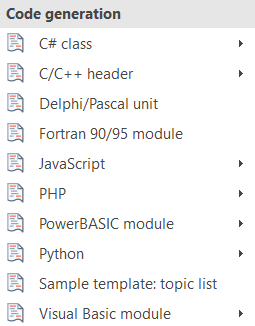Generate Code for programming languages
HelpNDoc can export topic identifiers, such as Help Ids and Help context numbers, to be used in programming projects. This makes it possible to integrate your documentation with external applications, so that topics can be displayed when triggered from software.

The export process works similarly to generating other documentation formats: you can either perform a quick export or configure it in detail through the Generate Documentation dialog.
Quick export of topic identifiers
To quickly export topic identifiers using the default settings:
- Go to the Home ribbon tab.
- Click the bottom part of the Generate Help button.
- Select the programming language in the Code generation section.
This will immediately generate the export file with predefined settings.
Export via the Generate Documentation dialog
For more control:
- Go to the Home ribbon tab.
- Click the top part of the Generate Help button.
- In the Generate Documentation dialog, add a Code generation build in the build list, and choose its template.
From here, you can adjust settings such as output location, and template programming language.
Supported programming languages
HelpNDoc supports exporting topic identifiers to a wide variety of programming languages and formats. Multiple export formats are provided for each language to accommodate different coding styles, project structures, or integration requirements. For example, identifiers can be exported as constants, enumerations, classes, or dictionaries depending on how you prefer to reference them in your codebase:
- C / C++
- C/C++ Constants - Exports topic identifiers as constant values.
- C/C++ Defines - Generates preprocessor #define directives for identifiers.
- C/C++ Enums - Creates enumerations of topic identifiers.
- C#
- C# Constants - Exports identifiers as constant fields.
- C# Dictionary - Generates a dictionary mapping identifiers to values.
- C# Enums - Creates enumerations for topic identifiers.
- C# Properties - Exports identifiers as C# properties.
- C# Struct - Places identifiers into a C# structure.
- Fortran
- Fortran 90/95 module - Generates a module containing constants for topic identifiers.
- JavaScript
- JavaScript Class - Exports identifiers as members of a class.
- JavaScript Constants - Generates identifiers as constant values.
- JavaScript Map - Produces a map object containing identifiers.
- JavaScript UMD - Creates a UMD (Universal Module Definition) export for identifiers.
- Delphi / Pascal
- Delphi/Pascal unit - Exports identifiers as constants in a Delphi or Pascal unit.
- PowerBASIC
- PowerBASIC Constants - Generates identifiers as constant values.
- PowerBASIC Enumerations - Creates enumerations for identifiers.
- PowerBASIC Enumerations SINGULAR - Generates enumerations with singular naming.
- PHP
- PHP array - Exports identifiers as elements in an array.
- PHP class - Creates a class containing identifiers.
- PHP define - Generates define constants.
- PHP enum - Produces enumeration-like constructs.
- Python
- Python class - Exports identifiers as class members.
- Python dictionary - Creates a dictionary mapping identifiers to values.
- Python enum - Generates enumeration classes.
- Python namedtuple - Exports identifiers as fields of a namedtuple.
- Visual Basic
- Visual Basic Constants - Exports identifiers as constants.
- Visual Basic Enums - Creates enumerations for identifiers.